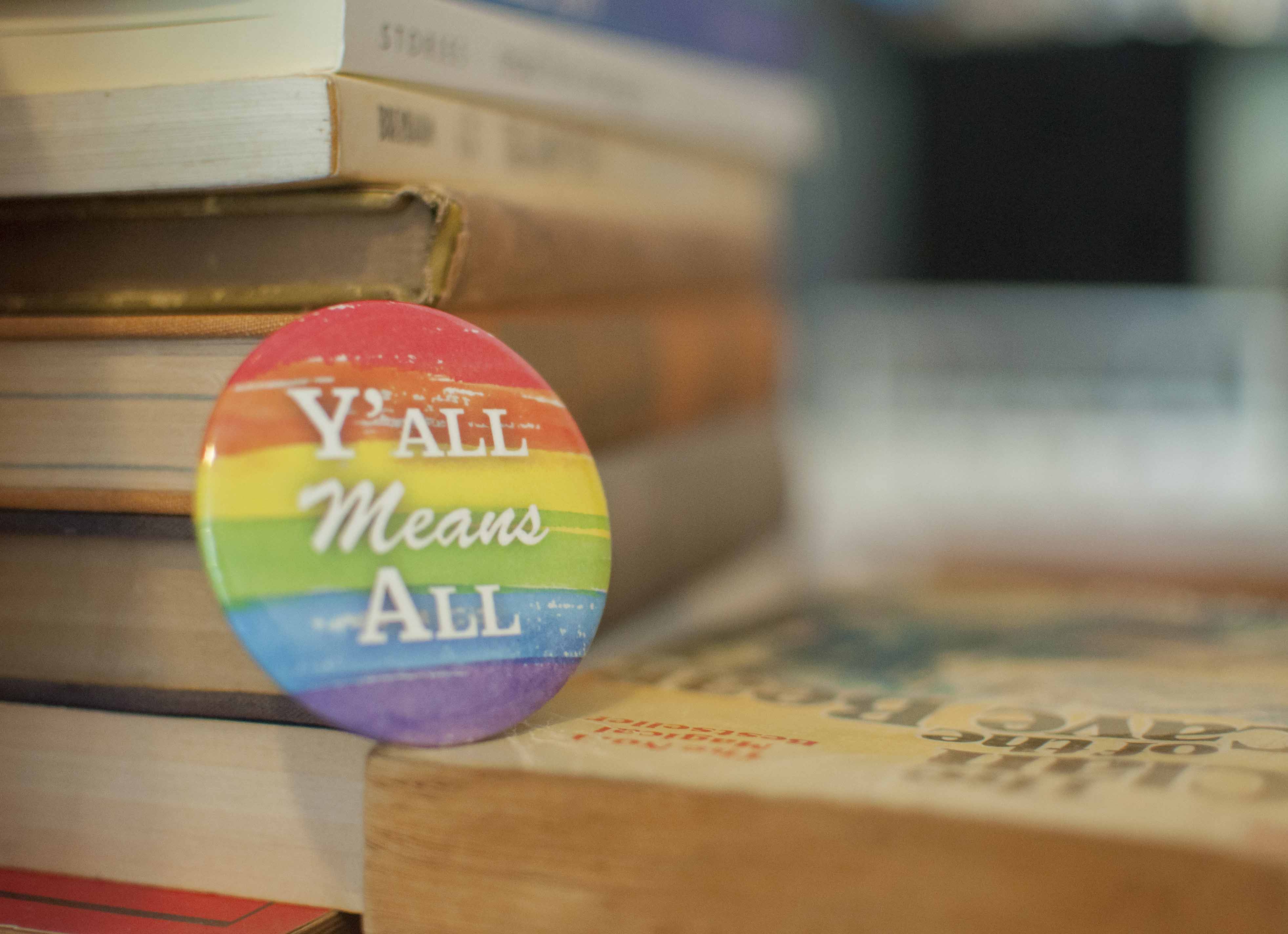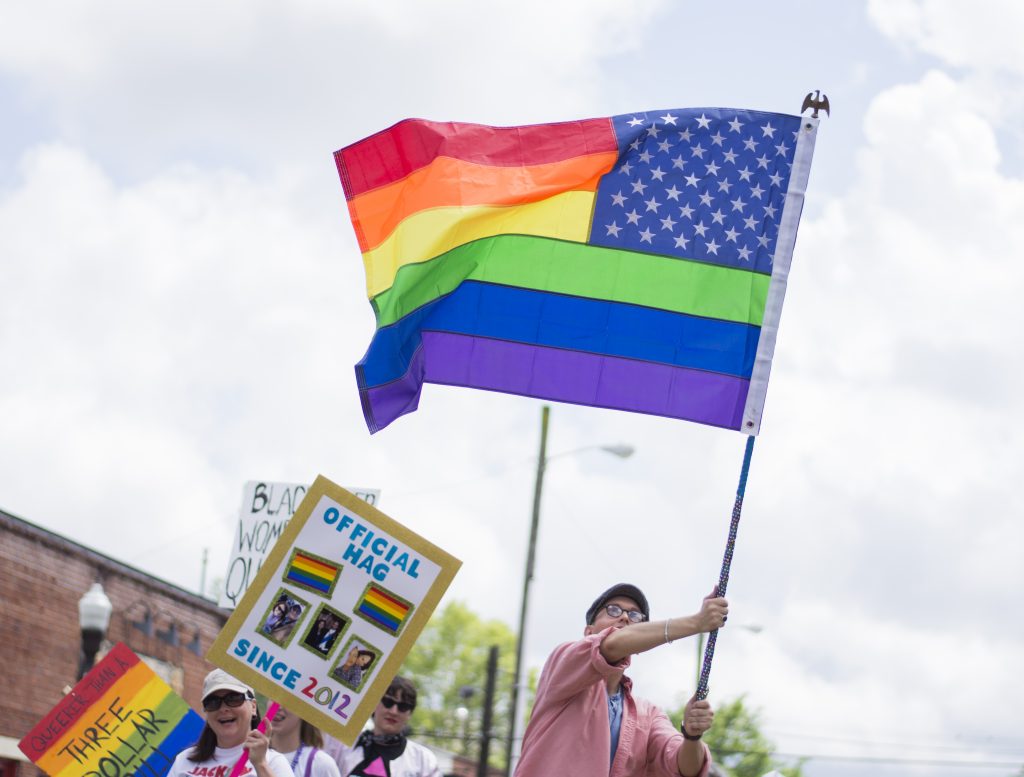Pride Month is a great time to not only celebrate LGBTQ people but also LGBTQ literature. While there are so many worthy queer books, the following works are a great introduction to different facets of queer life with an emphasis on the LGBTQ community in the South.
How to Survive a Summer – Nick White
 In “How to Survive a Summer,” Will Dillard, a graduate student, has to reckon with his past after viewing a trailer for the new horror film, “Proud Flesh.” This new movie is based on a conversion therapy camp he was forced to attend in his childhood. As Will travels back to the campsite in the Mississippi Delta, he recounts his torturous summer at Camp Levi where the campers were abused and baptized in a hazardous lake. White’s book explores the dangers of conversion therapy, but also shows the nuances of Mississippi. Through compelling narrative, Nick White brings to light the horrors of conversion therapy which is still legal in 37 states.
In “How to Survive a Summer,” Will Dillard, a graduate student, has to reckon with his past after viewing a trailer for the new horror film, “Proud Flesh.” This new movie is based on a conversion therapy camp he was forced to attend in his childhood. As Will travels back to the campsite in the Mississippi Delta, he recounts his torturous summer at Camp Levi where the campers were abused and baptized in a hazardous lake. White’s book explores the dangers of conversion therapy, but also shows the nuances of Mississippi. Through compelling narrative, Nick White brings to light the horrors of conversion therapy which is still legal in 37 states.
Mississippi Sissy – Kevin Sessums
Kevin Sessums’ honest and emotional memoire, “Mississippi Sissy,” recounts his childhood of growing up gay in Mississippi

during the 1950s and 60s. Sessums’ femininity growing up always made him an outsider, but this memoire explores muchmore than just being a flamboyant boy in the South. After losing both of his parents at a very young age, Sessums experiences many more tragedies such as sexual assault and the homophobic murder of his friend and mentor. Through personal narrative, Sessums very bluntly exposes racism in the South and in the LGBTQ community during the civil rights era. Although the memoire takes place over 50 years ago, “Mississippi Sissy” illuminates many issues still present today.
Against Equality: Queer Revolution Not Mere Inclusion – Edited by Ryan Conrad
 “Against Equality: Queer Revolution Not Mere Inclusion” is a collection of essays written by queer thinkers that argue against the mainstream LGBTQ fight for equality. These essays argue that most rights the LGBTQ community have been fighting for, such as marriage equality and inclusion in the military, are simply ways for those in power to silence dissent without actually addressing the systematic injustice in society. These essays will challenge you to question the queer community’s place in economic, prison and societal reform. At the very least, you will walk away from this collection asking yourself, “How can we most successfully liberate and empower LGBTQ people globally?”
“Against Equality: Queer Revolution Not Mere Inclusion” is a collection of essays written by queer thinkers that argue against the mainstream LGBTQ fight for equality. These essays argue that most rights the LGBTQ community have been fighting for, such as marriage equality and inclusion in the military, are simply ways for those in power to silence dissent without actually addressing the systematic injustice in society. These essays will challenge you to question the queer community’s place in economic, prison and societal reform. At the very least, you will walk away from this collection asking yourself, “How can we most successfully liberate and empower LGBTQ people globally?”
Redefining Realness – Janet Mock
In her brave memoire, “Redefining Realness,” Janet Mock brings the reader into her life of  overcoming obstacles on her quest for identity. Although born as her parents’ son, Mock always had the drive to be her own person and flourished even though her family lacked economic and educational resources. While navigating her teenage years without familial guidance, she not only succeeded academically, but also succeeded in regard to finding her true identity. From self-medication with hormones in her early teen years to traveling across the world for her gender reassignment surgery, Mock tells her story with a moving honesty and vulnerability. “Redefining Realness” addresses what it means to grow up as an economically challenged transgender woman of color and aims to open the hearts and minds of readers.
overcoming obstacles on her quest for identity. Although born as her parents’ son, Mock always had the drive to be her own person and flourished even though her family lacked economic and educational resources. While navigating her teenage years without familial guidance, she not only succeeded academically, but also succeeded in regard to finding her true identity. From self-medication with hormones in her early teen years to traveling across the world for her gender reassignment surgery, Mock tells her story with a moving honesty and vulnerability. “Redefining Realness” addresses what it means to grow up as an economically challenged transgender woman of color and aims to open the hearts and minds of readers.
A Little Life – Hanya Yanagihara
 “A Little Life” by Hanya Yanagihara is an ambitious tale of American queer life. The four main characters, Jude, Willem, JB, and Malcolm, all have very complex identities in regard to sexuality which challenges the norms of the gay identity and elevates this book from just a sensational gay novel to a groundbreaking piece of literature. Historical events central to New York City (the setting of the novel) and gay history are absent from this novel giving it a timeless feeling. “A Little Life” makes the reader focus on the trauma, relationships, and success of the individual characters, making it stand out from other works of gay fiction, which tend to share the themes of coming out and despair due to HIV. This narrative explores sexual abuse, friendships, and making your way in the world through a unique, queer lens.
“A Little Life” by Hanya Yanagihara is an ambitious tale of American queer life. The four main characters, Jude, Willem, JB, and Malcolm, all have very complex identities in regard to sexuality which challenges the norms of the gay identity and elevates this book from just a sensational gay novel to a groundbreaking piece of literature. Historical events central to New York City (the setting of the novel) and gay history are absent from this novel giving it a timeless feeling. “A Little Life” makes the reader focus on the trauma, relationships, and success of the individual characters, making it stand out from other works of gay fiction, which tend to share the themes of coming out and despair due to HIV. This narrative explores sexual abuse, friendships, and making your way in the world through a unique, queer lens.
Sweet Tea: Black Gay Men of the South – E. Patrick Johnson
In “Sweet Tea,” E. Patrick Johnson challenges the common stereotypes of the South through more than 60 biographies of Southern gay black men. “Sweet Tea” displays the South in a different way, rather than the usual racist and homophobic perspective, by showing the ways in which black gay men create identities, relationships, and communities in southern spaces. This book is an effective stride for a community hardly represented in media. While all of the stories are about gay black men, there is a huge diversity of age, occupation, and education level which creates an honest history of the queer black South. Johnson breaks down stereotypes through personal accounts involving gay black men and validates the existence of southern gay black men.
Southern gay black men. “Sweet Tea” displays the South in a different way, rather than the usual racist and homophobic perspective, by showing the ways in which black gay men create identities, relationships, and communities in southern spaces. This book is an effective stride for a community hardly represented in media. While all of the stories are about gay black men, there is a huge diversity of age, occupation, and education level which creates an honest history of the queer black South. Johnson breaks down stereotypes through personal accounts involving gay black men and validates the existence of southern gay black men.
500 Tips for Fat Girls – Mary Lambert
 While “500 Tips for Fat Girls” is not actually a book of tips, the best tip I can give you is to read this moving collection of poetry. In this book, Mary Lambert creates gorgeous poems on the topics of rape, mental health, body image, sexuality, and much more. These poignant poems will definitely make you cry, but they will also act as a catalyst for healing and self-love. From heartbreak to mental health, “500 Tips for Fat Girls” will help you explore these struggles and inspire you to fight these burdens through loving and accepting oneself. Lambert’s radical vulnerability and mastery of the English language are just two of the many components that make this collection of poetry so impactful in a society that tends to shy away from these important issues.
While “500 Tips for Fat Girls” is not actually a book of tips, the best tip I can give you is to read this moving collection of poetry. In this book, Mary Lambert creates gorgeous poems on the topics of rape, mental health, body image, sexuality, and much more. These poignant poems will definitely make you cry, but they will also act as a catalyst for healing and self-love. From heartbreak to mental health, “500 Tips for Fat Girls” will help you explore these struggles and inspire you to fight these burdens through loving and accepting oneself. Lambert’s radical vulnerability and mastery of the English language are just two of the many components that make this collection of poetry so impactful in a society that tends to shy away from these important issues.
Madness – Sam Sax
Sam Sax, a queer Jewish writer, won the 2016 National Poetry Series Competition with this debut collection of poems,  “Madness.” Sax’s poems address broad concepts, such as the evolution of diagnoses and treatment of mental health issues, but also address Sax’s personal experiences with mental health, sex, and addiction. Sax’s deft writing analyzes the intersection of medicine, mental health and the queer community and creates a sense of queer identity through queer slang and cultural references. If you are looking for a collection of poetry that does not shy away from taboo topics, then “Madness” is the groundbreaking collection of poems for you.
“Madness.” Sax’s poems address broad concepts, such as the evolution of diagnoses and treatment of mental health issues, but also address Sax’s personal experiences with mental health, sex, and addiction. Sax’s deft writing analyzes the intersection of medicine, mental health and the queer community and creates a sense of queer identity through queer slang and cultural references. If you are looking for a collection of poetry that does not shy away from taboo topics, then “Madness” is the groundbreaking collection of poems for you.
















